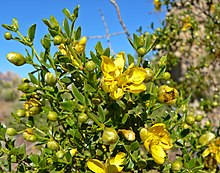FAIR and interactive data graphics from a scientific knowledge graph
Contents
| Zygophyllaceae | |
|---|---|

| |
| Larrea tridentata | |
| Scientific classification | |
| Kingdom: | Plantae |
| Clade: | Tracheophytes |
| Clade: | Angiosperms |
| Clade: | Eudicots |
| Clade: | Rosids |
| Order: | Zygophyllales |
| Family: | Zygophyllaceae R.Br. |
| Subfamilies | |
|
Larreoideae | |
| Synonyms | |
Zygophyllaceae is a family of flowering plants that contains the bean-caper and caltrop. The family includes around 285 species in 22 genera.[2]
Plants in the family Zygophyllaceae may be trees, shrubs, or herbs. They are often found in dry habitats. The leaves are usually opposite, often with stipules and spines. Some are cultivated as ornamental plants, such as species of the Guaiacum, Zygophyllum, Tribulus, and Larrea genera.[3] King Clone, a creosote bush (Larrea tridentata) in California, is among the world's oldest living organisms.
The distribution of plants in the Zygophyllaceae family can be found worldwide in warm tropics and cool-temperate subtropics with a concentration in hot, arid regions with alkaline soils.[4] Regions with different species from this family include Africa, south Asia, India, Australia and parts of the United States.[5]
Genera
- Subfamily Larreoideae
- Subfamily Morkillioideae
- Subfamily Seetzenioideae
- Subfamily Tribuloideae
- Balanites Delile
- Kallstroemia Scop.
- Kelleronia Schinz
- Neoluederitzia Schinz
- Sisyndite E.Mey. ex Sond.
- Tribulopis R.Br.
- Tribulus L.[9]
- Subfamily Zygophylloideae[10]
- Augea Thunb. – synonym of Zygophyllum[11]
- Fagonia L.
- Melocarpum (Engl.) Beier & Thulin
- Miltianthus Bunge
- Roepera A.Juss.
- Tetraena Maxim. – synonym of Zygophyllum[12]
- Zygophyllum L.
- Unplaced
- Metharme Phil. ex Engl.
- Plectrocarpa Gillies ex Hook. & Arn.[13]
Peganum was in Zygophyllaceae before being moved to the newly created family Nitrariaceae.
Systematics
In the APG III system of classification, the families Zygophyllaceae and Krameriaceae compose the order Zygophyllales. In the previous version of their classification system, the Angiosperm Phylogeny Group had included the option of placing Krameria within Zygophyllaceae.
Zygophyllaceae are divided into five subfamilies. Molecular phylogenies of the family were published in 2000[14] and 2018.[15] Phylogenies of groups within the family, particularly the predominantly southern African species of Zygophylloideae have also been published.[16][17][18]
Modern molecular phylogenetics suggest the following relationships:[10][14]
| Zygophyllales |
| ||||||
References
- ^ "Zygophyllaceae R. Br., nom. cons". Germplasm Resources Information Network. United States Department of Agriculture. 2003-01-17. Retrieved 2009-09-25.
- ^ Christenhusz, M. J. M. & Byng, J. W. (2016). "The number of known plants species in the world and its annual increase". Phytotaxa. 261 (3). Magnolia Press: 201–217. doi:10.11646/phytotaxa.261.3.1.
- ^ Zygophyllaceae in L. Watson and M.J. Dallwitz (1992 onwards). The families of flowering plants: descriptions, illustrations, identification, information retrieval.
- ^ Smith, G. F.; Figueiredo, E. (2022). "Zygophyllaceae". Dicotyledons: Rosids. pp. 1–5. doi:10.1007/978-3-030-85239-9_113-1. ISBN 978-3-030-85239-9.
- ^ "Zygophyllales | Desert & Tropical Plants, Medicinal Uses | Britannica".
- ^ "Genera of Zygophyllaceae subfam. Larreoideae". Germplasm Resources Information Network. United States Department of Agriculture. Retrieved 2010-08-15.
- ^ "Genera of Zygophyllaceae subfam. Morkillioideae". Germplasm Resources Information Network. United States Department of Agriculture. Retrieved 2010-08-15.
- ^ "Genera of Zygophyllaceae subfam. Seetzenioideae". Germplasm Resources Information Network. United States Department of Agriculture. Retrieved 2010-08-15.
- ^ "Genera of Zygophyllaceae subfam. Tribuloideae". Germplasm Resources Information Network. United States Department of Agriculture. Retrieved 2010-08-15.
- ^ a b Beier, B.-A.; Chase, M. W. & Thulin, M. (2003), "Phylogenetic relationships and taxonomy of subfamily Zygophylloideae (Zygophyllaceae) based on molecular and morphological data", Plant Systematics and Evolution, 240 (1–4): 11–39, Bibcode:2003PSyEv.240...11B, doi:10.1007/s00606-003-0007-0, S2CID 9299742
- ^ "Augea Thunb.". Plants of the World Online. Royal Botanic Gardens, Kew. Retrieved 2021-06-02.
- ^ "Tetraena Maxim". Plants of the World Online. Royal Botanic Gardens, Kew. Retrieved 2021-06-02.
- ^ "Genera of Zygophyllaceae". Germplasm Resources Information Network. United States Department of Agriculture. Retrieved 2010-08-15.
- ^ a b Sheahan MC, Chase MW (2000). "Phylogenetic Relationships within Zygophyllaceae Based on DNA Sequences of Three Plastid Regions, with Special Emphasis on Zygophylloideae". Syst Bot. 25 (2): 371–384. doi:10.2307/2666648. JSTOR 2666648. S2CID 85576133.
- ^ Wu, Sheng-Dan; Zhang, Lin-Jing; Lin, Li; Yu, Sheng-Xiang; Chen, Zhi-Duan; Wang, Wei (2018). "Insights into the historical assembly of global dryland floras: the diversification of Zygophyllaceae". BMC Evolutionary Biology. 18 (1): 166. Bibcode:2018BMCEE..18..166W. doi:10.1186/s12862-018-1277-z. ISSN 1471-2148. PMC 6234786. PMID 30413147.
- ^ Bellstedt, D.U.; van Zyl, L.; Marais, E.M.; Bytebier, B.; de Villiers, C.A.; Makwarela, A.M.; Dreyer, L.L. (2008). "Phylogenetic relationships, character evolution and biogeography of southern African members of Zygophyllum (Zygophyllaceae) based on three plastid regions". Molecular Phylogenetics and Evolution. 47 (3): 932–949. doi:10.1016/j.ympev.2008.02.019. ISSN 1055-7903. PMID 18407526.
- ^ Bellstedt, Dirk U.; Galley, Chloé; Pirie, Michael D.; Linder, H. Peter (2012). "The Migration of the Palaeotropical Arid Flora: Zygophylloideae as an Example". Systematic Botany. 37 (4): 951–959. doi:10.1600/036364412X656608. ISSN 0363-6445. S2CID 85625888.
- ^ Lauterbach, Maximilian; van der Merwe, Pieter de Wet; Keßler, Lisa; Pirie, Michael D.; Bellstedt, Dirk U.; Kadereit, Gudrun (2016). "Evolution of leaf anatomy in arid environments – A case study in southern African Tetraena and Roepera (Zygophyllaceae)". Molecular Phylogenetics and Evolution. 97: 129–144. doi:10.1016/j.ympev.2016.01.002. ISSN 1055-7903. PMID 26790586.
External links
- Family Zygophyllaceae Flowers in Israel
- Chilean Zygophyllaceae Chileflora

















